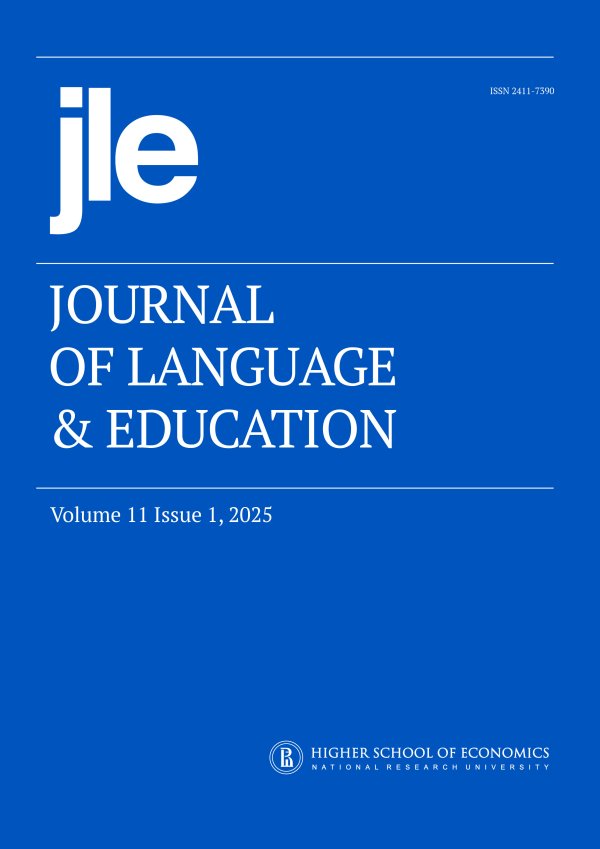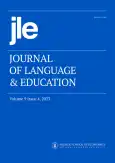Occasionalisms in Social Networks During the Pandemic
- Авторы: Gabrielova E.1, Lopatina V.1
-
Учреждения:
- HSE University, Moscow, Russian Federation
- Выпуск: Том 9, № 4 (2023)
- Страницы: 46-60
- Раздел: Оригинальное исследование
- URL: https://journal-vniispk.ru/2411-7390/article/view/302291
- DOI: https://doi.org/10.17323/jle.2023.15946
- ID: 302291
Цитировать
Полный текст
Аннотация
Background: This study explores and analyses occasionalisms that were created by social network users during the COVID-19 pandemic. The theoretical framework of this research is based on observing the concepts of occasionalism, neologism and nonce word.
Purpose: To indicate occasionalisms in the Russian and English languages and compare them in terms of word-formation, frequencies, part of speech and meanings, thus making a contribution to the understanding of how occasionalisms emerge in these languages.
Method: A qualitative and quantitative content analyses are used for data collection. The sample is obtained from different social networks (‘Facebook[1]’, ‘Twitter[2]’, ‘Reddit’ and ‘VK’). Results: Occasionalisms are created mostly through blending, compounding, and affixation. Mixed word-formation methods are also used. The most used parts of speech appear to be nouns and adjectives. The most Russian occasionalisms are ironic, expressive and attract attention, while English occasionalisms are not that expressive as they refer to medical or political concepts. Borrowings from English in the Russian occasionalisms are also indicated. The glossary of 106 occasionalisms in the Russian and English languages is introduced at the end of the study.
Conclusion: The results might expand the knowledge of new vocabulary items in the field of lexicology and stylistics, and have practical implications in language teaching and translations, as occasionalisms may frequently create obstacles for foreign language students and translators. They also may serve as a basis for further studies on neologisms, occasionalisms and nonce words generated during the pandemic and cover the gap in comparative studies of the Russian and English occasionalisms. In addition, the obtained results might be beneficial for future research in sociolinguistics and sociocultural linguistics providing greater awareness of the linguistic and sociocultural factors that impact the adoption and use of occasionalisms in both languages.
Ключевые слова
Об авторах
E. Gabrielova
HSE University, Moscow, Russian Federation
Автор, ответственный за переписку.
Email: evgabrielova@hse.ru
V. Lopatina
HSE University, Moscow, Russian Federation
Email: vitalialopatinae@gmail.com
Список литературы
- Ahmad, K. (2000). Neologisms, nonces and word formation. Proceedings of the Ninth EURALEX International Congress, Stuttgart, Germany (pp. 711-729). EURALEX 2000.
- Akmajian, A., Demers, R. A., Farmer, A. K., & Harnish, R. M. (2010). Linguistics: An introduction to language and communication (6th ed.). Massachusetts Institute of Technology.
- Al-Salman, S., & Haider, A. S. (2021). COVID-19 trending neologisms and word formation processes in English.Russian Journal of Linguistics, 25(1), 24-42. DOI: https://doi.org/10.22363/2687-0088-2021-25-1-24-42
- Alieva, P. M. (2016). Linguistic features of occasionalisms and authors' neologisms in the English language. Filologicheskie Nauki. Voprosy Teorii i Praktiki, 5-1(59), 33-36.
- Arndt-Lappe, S., Braun, A., Moulin, C., & Winter-Froemel, E. (2018). Expanding the lexicon: Linguistic innovation, morphological productivity, and ludicity. De Gruyter. DOI: https://doi.org/10.1515/9783110501933
- Arnold, I. V. (2012). Lexicololgy of the modern English language (2nd ed.). Flinta.
- Belova, N. A. (2009). O kriteriah razgranicheniya ponyatii neologism, occasionalism i potencial'noe slovo' [On criteria of distinction of notions neologism, occasionalism and potential word]. XVI Mezhdunarodnaya Konferencia Studentov, Aspirantov i Molodyih Uchenih Lomonosov. Moscow State University.
- Cain, K., Oakhill, J., & Lemmon, K. (2004). Individual differences in the inference of word meanings from context: The influence of reading comprehension, vocabulary knowledge, and memory capacity. Journal of educational psychology, 96(4), 671-681. DOI: https://doi.org/10.1037/0022-0663.96.4.671
- Carroll, L. (1872). Jabberwocky. Poems, puzzles, and stories of Lewis Carroll. Macmillan.
- Colb, W., Dressler, W. U., & Mattiello, E. (2023). Human and machine translation of occasionalisms in literary texts: Johann Nestroy's Der Talisman and its English translations. Target.International Journal of Translation Studies, 35(4), 540-572. DOI: https://doi.org/10.1075/target.21147.kol
- Crystal, D. (2008). A Dictionary of linguistics and phonetics (6th ed.). Wiley-Blackwell.
- Crystal, D. (2011).Internet linguistics: A student guide. Routledge.
- Egorova, E. V., Krasheninnikova, E. I., & Krasheninnikova, N. A. (2021). Neologisms of COVID Era. Current Issues in Philology and Pedagogical Linguistics, 4, 207-216. DOI: https://doi.org/10.29025/2079-6021-2021-4-207-216
- Eismann, W. 2015. Individual initiatives and concepts for expanding the lexicon in Russian. In Word-Formation: An international handbook of the languages of Europe (vol. 3). De Gruyter Mouton.
- Egoshina, T. E. (2007). Okkazionalizmy vs neololgizmy: kriterii perehoda [Occasionalisms vs neologisms: Criteria of transition]. Kultura Narodov Prichernomoria, 107, 47-52.
- Feldman, N. I. (1957). Okkazional'nye slova i lexicografia [Occasional words and lexicography]. Voprosy Yazikoznaniya, 4, 64-73.
- Fowles J. (1980). The ebony tower. The enigma. Progress Publishers.
- Gabrielova, E. V., & Maksimenko, O. I. (2021). Implicit vs explicit evaluation: How English-speaking Twitter users discuss migration problems.Russian Journal of Linguistics, 25(1), 105-124. DOI: https://doi.org/10.22363/2687-0088-2021-25-1-105-124
- Gekkina, E. N., & Kozhevnikov, A. Yu. (2021). Tendentsii leksicheskogo obnovleniia v otrazhenii koronavirusnih slov [Trends of lexical revitalization in the reflection of coronavirus words]. Cherepovets State University Bulletin, (3), 95-108. DOI: https://doi.org/10.23859/1994-0637-2021-3-102-7
- Goel, R., Soni, S., Goyal, N., Paparrizos, J., Wallach, H.M., Diaz, F., & Eisenstein, J. (2016). The social dynamics of language change in online networks. In: E. Spiro, & Y.Y. Ahn, (Eds), Social Informatics. Lecture Notes in Computer Science, 10046. Springer. DOI: https://doi.org/10.1007/978-3-319-47880-7_3
- Hanpira, E. (1966). Ob okkazional'nom slove i okkazional'nom slovoobrazovanii [On occasional word and occasional word-formation]. In E.A. Zemskaya & D.N. Shmeleva (Eds), Razvitie slovoobrazovaniya sovremennogo russkogo yazika (pp. 153-166). Nauka.
- Katamba, F. (2005). English words: Structure, history, usage. Psychology Press.
- Khromyh, A. A. (2016). Okkazional'nie slova i trydnosti ih perevoda [Phraseological units in English and Russian and their translation]. Aktual'nie Voprosy Filologicheskoi Nauki XXI Veka, 188-194.
- Kondrasheva, E. V., & Tinina A. O. (2019) Verbal aggression in the language of media: the varieties and causes. Epoha Nauki, 18, 134-139. DOI: https://doi.org/10.24411/2409-3203-2019-00060
- Kuharenko, V. A. (2011) Seminars in stylistics (5th ed.). Flinta.
- Liu, W., & Liu, W. (2014). Analysis on the word-formation of English netspeak neologism. Journal of Arts Humanities, 3(12), 22-30. DOI: https://doi.org/10.18533/journal.v3i12.624
- Lopatin, V. (1973). Rozhdenie slova. Neologizmy i okkazional'nye obrazovaniya [The birth of the word. Neologisms and occasional formations]. Nauka.
- Lykov, A. G. (1976). Okkazionalnoe slovo kak lexicheskaya edinica rechi [Occasional word as a lexical unit]. Filologicheskie Nauki, 5, 70-78.
- Malkin, N., Lanka, S., Goel, P., Rao, S., & Jojic, N. (2021). GPT Perdetry Test: Generating new meanings for new words. Proceedings of the 2021 Conference of the North American Chapter of the Association for Computational Linguistics: Human Language Technologies, 5542-5553. Association for Computational Linguistics.
- Mattiello, E. (2017). Analogy in word-formation: A study of English neologisms and occasionalisms (vol. 309). Walter de Gruyter GmbH & Co KG.
- Mweri, J. G. (2021). Corona virus disease (COVID-19) effects on language use: An analysis of neologisms. Linguistics and Literature Studies, 9(1), 36-47. DOI: https://doi.org/10.13189/lls.2021.090105
- Orel, A., & Vasik, Y. (2021). Language of corona-Twitter: Covid-19 Neologisms.InterConf, 158-164. DOI: https://doi.org/10.51582/interconf.19-20.08.2021.015
- Pahomova, M. A. (2013). Okkazional'nie slova i slovari okkazionalizmov [Occasional words and dictionaries of occasionalisms]. Bulletin of the Sholokhov Moscow State University for the Humanities, 3, 79-87.
- Piller, I., Zhang, J., & Li, J. (2020). Linguistic diversity in a time of crisis: Language challenges of the COVID-19 pandemic.
- Multilingua, 39(5), 503-515. DOI: https://doi.org/10.1515/multi-2020-0136
- Poix, C. (2017). Neology in children's literature: A typology of occasionalisms. Lexis, 12. DOI: https://doi.org/10.4000/lexis.2111
- Ratih, E., & Gusdian, R. I. (2018). Word formation processes in English new words of Oxford English Dictionary (OED) online. A Journal of Culture English Language Teaching Literature & Linguistics, 5(2), 24. DOI: https://doi.org/10.22219/celticumm.vol5.no2.24-35
- Reynolds, B. (2020). The effects of nonce words, frequency, contextual richness, and L2 vocabulary knowledge on the incidental acquisition of vocabulary through reading: more than a replication of Zahar et al. (2001) & Tekmen and Daloğlu (2006). International Review of Applied Linguistics in Language Teaching, 58(1), 75-102. DOI: https://doi.org/10.1515/iral-2015-0115
- Rúa, P.L. (2010). Making and breaking the rules: lexical creativity in the alternative music scene. Language Awareness, 19, 51 - 67. DOI: https://doi.org/10.1080/09658410903197363
- Skrylnik, A. V. (2017). Sposoby obrazovaniya avtorskih neologizmov v angliyskom yazike na materiale knig J. K. Rowling. Filologicheskie Nauki. Voprosy Teorii i Praktiki, 7-1(73), 154-157.
- Terry, A. (2021). Questioning the purpose and success of occasionalisms as a source of humour in How I Met your Mother. Lexis. Journal in English Lexicology, 17. DOI: https://doi.org/10.4000/lexis.5399
- Vdovichenko, Y. S., & Kudritskaya, M. I. (2020). The investigation of occasionalisms based on iconic and modern works. Pedagogicheskaya Nauka i Praktika, 2(28), 28-32.
- Vinokur, G. O. (1943). Mayakovsky - novator yazika [Mayakovky is an innovator of language]. URSS.
- Yudina, A. D. (2020). Occasionalisms motivated by proper names. Izvestia: Herzen University Journal of Humanities & Sciences, (195), 126-134. DOI: https://doi.org/10.33910/1992-6464-2020-195-126-134
- Zemskaya, E. A. (1992). Slovoobrazovanie kak deyatel'nost [Word-formation as an activity]. Nauka.
Дополнительные файлы











